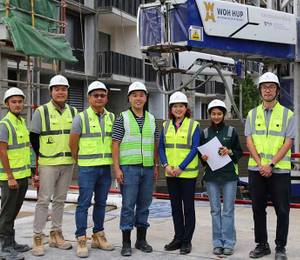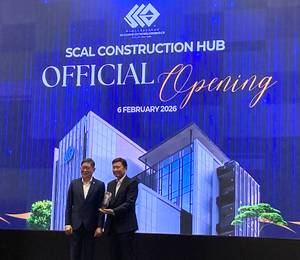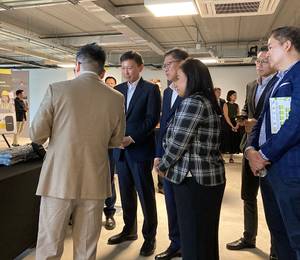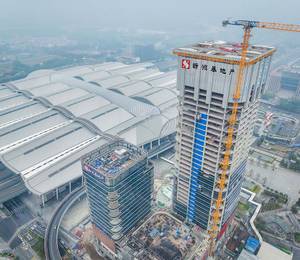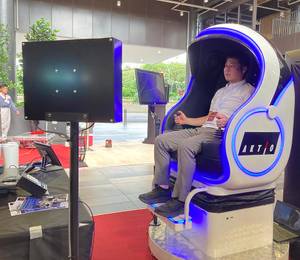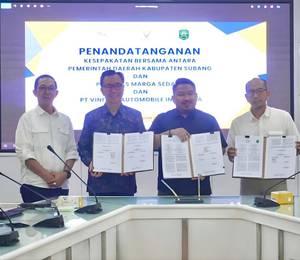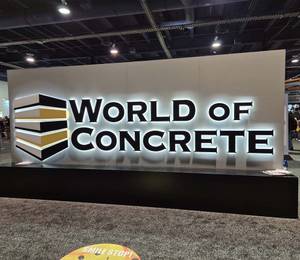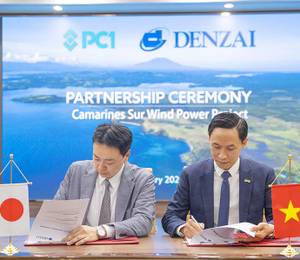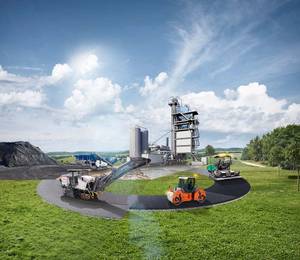Singapore-based Kim Hock Corporation, a leading player in the metal recycling business, is trialling Southeast Asia’s first fully-electric Volvo construction machines. This move is part of the company’s commitment to attaining a net-zero carbon footprint and enhancing the overall sustainability of its operations.
“We are proud and excited to be the first company in Singapore with the access to these electric machines,” said TS Lim, general manager of Kim Hock. “Throughout our history, we’ve used technology to help us work more effectively and in a greener way.
The two L25 Electric compact wheel loaders from Volvo Construction Equipment (Volvo CE) are being assessed at Kim Hock’s Jurong facility. They are battery-powered, delivering zero exhaust emissions. “Not only that, there’s also zero noise and no vibrations in the cab, which means a calmer work environment for the operator,” added Mr Lim. “The machine charging process is simple. We do an hour during lunch and a standard charge overnight.”
Each of the electric machines comes with a 40 kWh battery pack, and is expected to carry out six to eight hours of work per charge. It features a 2.1 t payload and a maximum speed of 20 kph. “We are very impressed with them. The power and performance are comparable to diesel machines,” said Mr Lim. [Scroll down to watch a video of the L25 Electric in action at Kim Hock facility).
The Kim Hock facility is one of the largest recycling plants of its type in Singapore, handling more than 15,000 t of steel per month, and stripping out other metals for re-use, including copper and aluminium. It also collects and recycles wood and horticultural waste, employing a variety of machinery to assist with different stages of its work and continually updating its infrastructure to make the business greener.
Supporting Singapore Green Plan
Sustainability has been a key focus for Kim Hock. In collaboration with Volvo CE’s Special Application Solutions (SAS) team, Kim Hock is exploring the potential acquisition of two EC480EL excavators, dual-powered with an electric motor and a Volvo Stage V diesel engine. The machines operate mostly using their electric motor, which is attached via cable directly to the mains power supply. In situations where they are not able to operate via electric power, they run from the in-built diesel engine.
Over the last several years, Kim Hock has also started recycling wood and horticultural waste, to produce wood chips. These are used as a power source to generate electricity to power several functions at the plant and sold externally to be used in new products.
“As an industrial company, we know we have a part to play in creating a greener Singapore, and we have aligned many aspects of our business with the government’s Singapore Green Plan 2030,” said Mr Lim. “Exploring the utilisation of these new electric machines from Volvo helps us move towards our goal of being a low emissions business with a net-zero level of industrial waste. Our customers have ambitions to decarbonise and with our passionate team and technology partners such as Volvo, we are committed to support them in their pursuit of reaching their targets.”
Given that Kim Hock handles approximately 200,000 t of scrap metal annually, processing it for resale to steel mills and foundries, the incorporation of advanced technology also remains pivotal to its ongoing process. Notably, the company has embraced continuous computer control since 2014, effectively automating significant portions of its work processes.
Green machines
The L25 Electric compact wheel loader is one of the three battery-powered models that Volvo CE recently launched in Singapore for the Southeast Asian market. The other two include the ECR25 Electric compact excavator and EC55 Electric excavator.
These electric construction machines have the potential to transform the construction industry, helping users meet their sustainability requirements or regulations, highlighted Volvo CE. The machines can also be deployed in new locations, such as indoors, or in other sensitive areas.
The introduction of the electric machines in Southeast Asia marks another step forward for Volvo CE in achieving its sustainability goals. “By 2040, we want 100% of the vehicles we produce to be fossil free. We expect a gradual shift into battery electric and fuel-cell electric vehicles, but we know the decarbonisation journey will take place at different rates in different parts of the world,” explained Tomas Kuta, president of Asia region at Volvo CE.
“Here in Singapore, where the Singapore Green Plan 2030 is driving the country forward, we believe there is strong potential for much wider use of electric machines in the construction industry.”
Related News:
SE Asia’s first fully-electric Volvo construction machines arrive in Singapore

